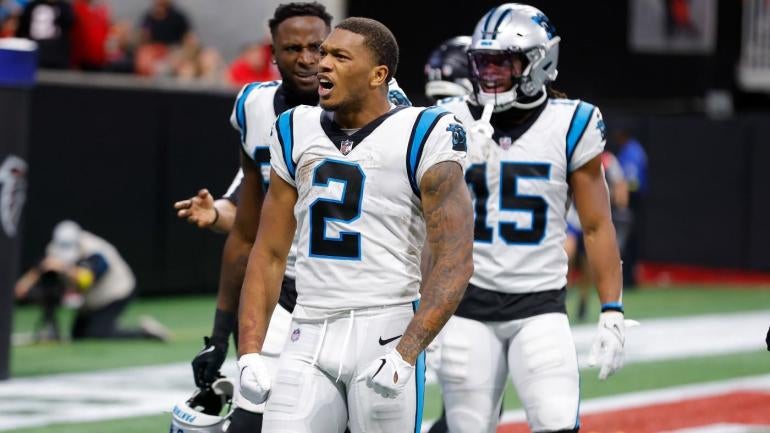
The NFL had consecutive weeks where prominent players took off their helmets in acts of celebration in the closing minutes of play. In Week 8, Carolina Panthers wide receiver D.J. Moore got flagged for it. In Week 9, Rams cornerback Jalen Ramsey did not.
The apparent contradiction has led to many questions about the application and consistency of the unsportsmanlike conduct rule. But what's ultimately lacking, according to one source, is a well-written rule and a little common sense.
According to the rulebook, officials will flag players for unsportsmanlike conduct should they see a "removal of his helmet by a player in the field of play or the end zone during a celebration or demonstration, or during a confrontation with a game official or any other player."
In Week 8, Moore was flagged for the penalty when he removed his helmet after catching a 62-yard touchdown in the closing seconds of regulation against the Falcons. Moore had walked out of the back of the end zone -- so he was technically neither in the field of play nor in the end zone -- and removed his helmet in celebration.
Though tight end Stephen Sullivan also removed his helmet in the field of play, the officials flagged Moore for the penalty. That backed up the extra point, which was missed, and the Panthers ultimately went to overtime and lost to the Falcons.

Pick Six Newsletter
Crafted By The Best NFL Experts
Get the day's big stories + fun stuff you love like mock drafts, picks and power rankings.
Thanks for signing up!
Keep an eye on your inbox.
Sorry!
There was an error processing your subscription.
In last Sunday's game between the Rams and Buccaneers, Ramsey celebrated an end-zone stop in the final two minutes of the game by running toward his sideline after the turnover on downs. Video replay showed Ramsey removing his helmet before crossing the boundary to the Rams' sideline, so he was technically in the field of play when he did this. No flag was thrown.
As written, the rule, which was established in the late 1990s and has since been slightly tweaked, leaves something to be desired in these two instances. Officials have been instructed -- and they were reminded in the past two weeks - to use a "heavy dose of common sense" when applying the rules, drawing from a quote from Hall of Fame official Art McNally.
Was Ramsey technically in the field of play? Yes. Was he a second away from crossing the boundary to celebrate with his own teammates on his own sideline? Yes. And while Moore had technically crossed the end-zone boundary, he didn't immediately enter a magical realm where no flag could be thrown.
That's how the league sees it. But, of course, there's a complicating factor.
Jon Runyan, the league's VP of policy and rules administration, doesn't have to apply the "heavy dose of common sense" to punishments for players. A source says he views things in black-and-white terms.
So Moore wasn't fined for unsportsmanlike conduct, even though he was flagged for it. Sullivan, though, was fined $4,583 for removing his helmet on the field.
Upon reviewing the film each week, the officiating department has to say whether something violated the rules before Runyan decides on a punishment. Ramsey was not fined for removing his helmet last Sunday, according to a source, implying that the group did not feel Ramsey violated any rules. As a result, Runyan wasn't allowed to fine him if he even felt he should be.
















